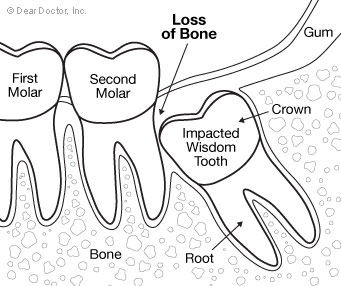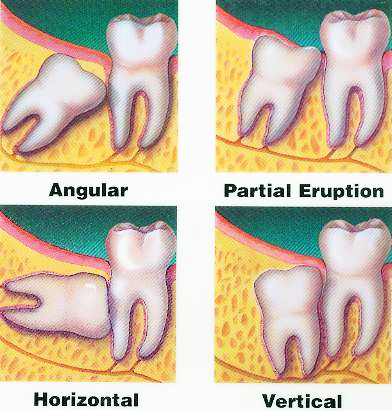So you must be experiencing some trouble because of your trapped tooth which is resisting to come out. You'll likely need your impacted wisdom
tooth pulled if it results in problems such as:
- Pain
- Food and
debris getting stuck behind the wisdom tooth
- Infection or
gum disease (periodontal disease)
- Tooth decay
in a partially erupted wisdom tooth
- Damage to a
nearby tooth or surrounding bone
- Development
of a fluid-filled sac (cyst) around the wisdom tooth
- Complications
with orthodontic treatments to straighten other teeth

Wisdom tooth extraction at Cosmodent India?
Human
beings have four wisdom teeth, located at the four corners of the oral cavity.
It is the last tooth present in the mouth. For most of the people this tooth
doesn't have space to come out of the jaw bone to the oral cavity which will result
in mentioned problems.
So our
experts will advise for the removal of the particular wisdom tooth for bringing
you ease.To prevent
potential future problems, some dentists and oral surgeons recommend wisdom
tooth extraction even if impacted teeth aren't currently causing problems.
The removal of wisdom teeth can be a difficult and painful process. For those in Gurgaon seeking help with this, Cosmodent India is the perfect place to turn. With experienced dentists and advanced technology, they can make the process as comfortable and straightforward as possible.
Cosmodent India offers many options for wisdom tooth removal in Gurgaon India, ranging from basic extractions to more complicated procedures that involve sectioning or repositioning the tooth. The team will take into account factors such as age, medical history, type of tooth and condition before deciding on an appropriate course of action.
Cosmodent India makes sure that their patients are well-informed about the procedure itself so that they can relax knowing what will happen before, during and after the extraction.
An impacted wisdom tooth may:
- Grow at an angle toward the next tooth (second
molar)
- Grow at an angle toward the back of the mouth
- Grow at a right angle to the other teeth, as if
the wisdom tooth is "lying down" within the jawbone
- Grow straight up or down like other teeth but
stay trapped within the jawbone

Wisdom tooth removal procedure is done by our best
oral surgeons, procedures are less invasive.
After the procedure
If you receive sedation anesthesia or general
anesthesia, you're taken to a recovery room after the procedure. If you have
local anesthesia, your brief recovery time is likely in the dental chair
As you heal from your surgery, follow
your dentist's instructions on:
Bleeding. Some oozing of blood may occur the first day
after wisdom tooth removal. Try to avoid excessive spitting so that you don't
dislodge the blood clot from the socket. Replace gauze over the extraction site
as directed by your dentist or oral surgeon.
Pain management. You may be able to manage
pain with an over-the-counter pain reliever, such as acetaminophen (Tylenol,
others), or a prescription pain medication from your dentist or oral surgeon.
Prescription pain medication may be especially helpful if bone has been removed
during the procedure. Holding a cold pack against your jaw also may relieve
pain.
Swelling and bruising. Use an ice pack as
directed by your dentist or surgeon. Any swelling of your cheeks usually
improves in two or three days. Bruising may take several more days to resolve.
Activity. After your surgery, plan to rest for the
remainder of the day. Resume normal activities the next day, but for at least a
week, avoid strenuous activity that might result in losing the blood clot from
the socket.
Beverages. Drink lots of water after
the surgery. Don't drink alcoholic, caffeinated, carbonated or hot beverages in
the first 24 hours. Don't drink with a straw for at least a week because the
sucking action can dislodge the blood clot from the socket.
Food. Eat only soft foods, such as yogurt or
applesauce, for the first 24 hours. Start eating semisoft foods when you can
tolerate them. Avoid hard, chewy, hot or spicy foods that might get stuck in
the socket or irritate the wound.
Cleaning your mouth. Don't brush your teeth,
rinse your mouth, spit or use mouthwash during the first 24 hours after
surgery. Typically you'll be told to resume brushing your teeth after the first
24 hours. Be particularly gentle near the surgical wound when brushing and
gently rinse your mouth with warm salt water every two hours and after meals
for a week.
Tobacco use. If you smoke, don't do so
for at least 72 hours after surgery — and wait longer than that if possible. If
you chew tobacco, don't use it for at least a week. Using tobacco products
after oral surgery can delay healing and increase the risk of complications.
Stitches.You may have stitches that dissolve within a
few weeks or no stitches at all. If your stitches need to be removed, schedule
an appointment to have them taken out.
Finally we do a follow up, Our experts will make
sure that the operated area is healing properly.